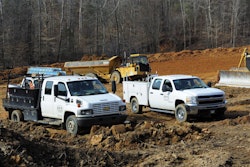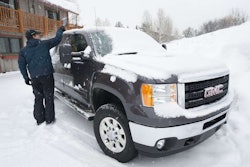 A snatch block maximizes pulling power and reduces battery drain
A snatch block maximizes pulling power and reduces battery drain
By Bruce W. Smith
Those who work in the heavy construction, road building, oil/gas production and landscaping world never know when the winches on the front bumper of their pickups are going to be called upon to save the day.
But it’s a sure bet the odds of using a winch are going to be multiplied during the winter and early spring more than any other time of the year.
When the time comes to spool out that winch cable or rope, the safety of the person holding the winch control and those in close proximity are the highest priority.
That’s why we all know the best place to operate the winch is from inside the cab – or at least to the side and behind the driver’s door so you have some protection if something breaks under the stress.
That’s also why you keep onlookers a safe distance away from the action.
Keeping the winch and your pickup’s battery system protected is also a big safety issue during “self-recovery” operations.
MAXIMUM PULL
The best way to accomplish both is using a snatch block for any winching task.
A winch’s greatest pulling power is on the last two layers of the cable closest to the drum. Combine that line position with a snatch block and you effectively double the winch’s rated pulling power – and cut the drain on the battery the electrical system.
But to do so the winch line has to double-back to the vehcile.
The line must run through the snatch block and the hook-end secured back on the vehicle with the winch.
This basic winching setup provides a 2:1 mechanical advantage – and allows you to run out enough winch cable to be down on the winch’s “power layers.”
ACCESSORY KITS
That’s why every pickup in your fleet equipped with a heavy-duty winch should carry a winch accessory kit with a tree-saver strap, choker chains, shackles, a snatch block, winch straps and leather gloves.
Notice many of the items listed above are plural.
Most winch accessory kits come with one item each. But winches being used around the jobsite or in the field often require longer, heavier and more difficult pulls than those encountered during a weekend hunting outing.
Two 30-foot winch straps, a pair of six-foot choker chains, a heavy duty snatch block and three or four shackles in your truck will handle most winching situations.
Having these items at your disposal when the winch on your rig might be the only one for miles around is smart thinking.
Sure, they take up a bit more room, but the time these winching necessities save in a pinch is well worth that little bit of lost space in the toolbox or under the back seat.
So the safety tip: Have your pickups equipped with reliable winches – and the right items to make the proper connections safe and secure.








